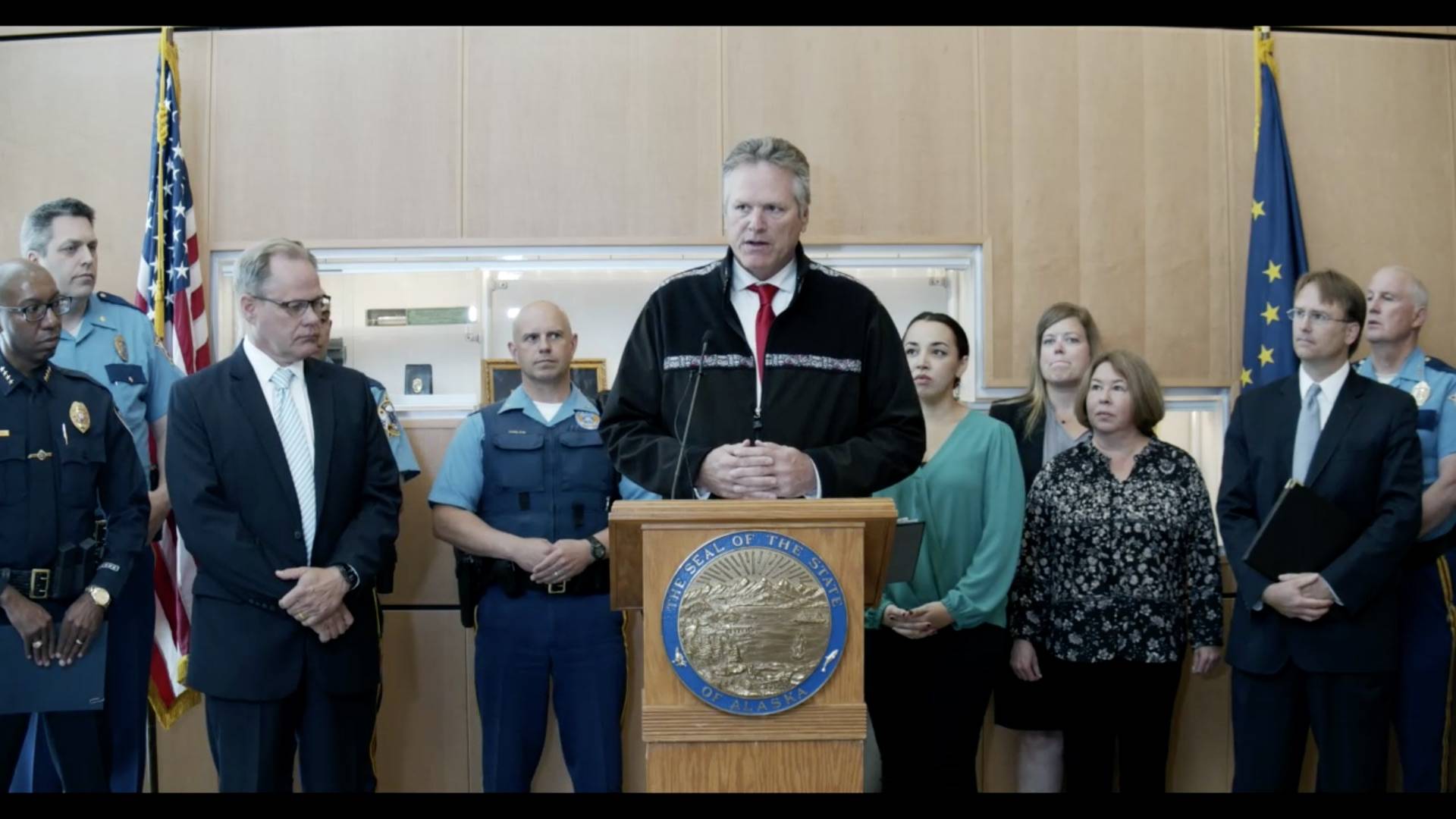Gov. Mike Dunleavy on Tuesday outlined measures the state will undertake to tackle the “scourge” of sexual assault in Alaska.
During a press conference streamed live from the Alaska Department of Public Safety Crime Lab in Anchorage, Dunleavy announced a streamlined process for allowing sexual assault survivors to track their sexual assault kits. The state will also more rigorously work to collect DNA samples from offenders who by law are required to give them.
Dunleavy was joined by Municipality of Anchorage Mayor Dave Bronson, Anchorage Police Department Chief Ken McCoy, DPS Commissioner Jim Cockrell, Alaska Department of Corrections Commissioner Nancy Dahlstrom, Alaska Deputy Attorney General John Skidmore and advocates for survivors of sexual assault.
Dunleavy intends to pay for the initiative using $1.1 million in funds received via the federal American Rescue Plan Act (ARPA) approved by Congress earlier this year, according to a press release from Dunleavy’s office.
Skidmore said that the state is authorized under Alaska State Statute 44.41.035 to collect DNA from anyone arrested and convicted of crimes against a person or of a felony, but that the statute has been amended eight times over the last 25 years.
“That’s made some challenges in terms of trying to figure out what’s supposed to be collected (and) when,” Skidmore said.
Once collected, DNA can be added to the federal Combined DNA Index System, or CODIS, which Skidmore said can help solve cases that previously have run cold.
“When you take DNA left behind at the crime scene collected in that investigation, you can compare it to this database of known DNA,” Skidmore said. “It helps us solve crimes where we didn’t otherwise have leads for law enforcement to pursue.”
For example, Skidmore said a CODIS hit was successful in prosecuting a cold sexual assault case on the Kenai Peninsula. Carmen Perzechino, of Sterling, was sentenced to 37 years in prison earlier this year for sexually assaulting and kidnapping a woman in 2001.
In that case, state troopers responded and conducted a sexual assault response callout, including the collection of sexual assault kit. Trooper investigation into the incident was unable to identify a suspect or vehicle involved. The victim’s assault kit was not sent to the State Crime Lab for DNA testing “due to standard practice” at the time because there was not an identified suspect against which the DNA from the kit could be compared.
The kit was tested later as part of a federal grant under the Sexual Assault Kit Initiative (SAKI) program, an effort started in 2016 to test all untested kits. Perzechino became a suspect after the victim’s kit was tested, according to previous Clarion reporting.
Skidmore said that, according to a report issued Tuesday, more than 21,000 DNA samples are owed to the state, including about 1,500 from people who have died. About 600 of those are owed by violent offenders, Skidmore said, which is where the state will begin addressing the backlog.
“The areas that we’re going to start with are those (people) that were convicted of a felony crime against a person,” Skidmore said. “We talked about this large number that was 20,000, there are less than 600 of a felony crime against a person for which there’s DNA owed. That’s where we’re going to start our efforts.”
Skidmore said one of the ways the state will be able to enforce DNA collection efforts will come from a different state statute, which says people convicted of certain crimes who refuse to provide DNA can be charged with a new class C felony.
Alaska Department of Corrections Commissioner Nancy Dahlstrom said the acceleration of how the department collects DNA will take a three-pronged approach. First, Dahlstrom said DOC will work with DPS to collect DNA from people who are currently incarcerated and owe DNA. Second, DOC probation and parole officers will work to collect owed DNA from offenders still on supervision. Last, DOC will proactively collect DNA from offenders booked into a facility on a charge that falls under the law guiding the state’s efforts.
DPS will also launch a new online portal that will allow survivors of sexual assault to track the status of their sexual assault kits and request updates on the status of their investigation, Cockrell said Tuesday. Cockrell said the tool is trauma-informed and should allow for the “smooth submittal” of kits to the state crime lab.
Blaze Bell, who said she is a survivor of sexual assault and now works with Victims for Justice and Standing Together Against Rape, Inc., thanked the state for working together on the initiatives.
“Chief (Ken) McCoy was actually on my case originally; this is really a full circle moment for me as a survivor,” Bell said. “I’m incredibly grateful that you are all coming together to help other sexual assault survivors.”
Dunleavy closed by saying advances in technology are helping to ensure justice is served more quickly in Alaska.
“I would strongly, strongly say to those that would even contemplate committing crimes of this nature on fellow Alaskans that the days of getting away with it are over,” Dunleavy said. “That as we advance in our technology and our tools, that as this information is organized in a manner that’s going to be conducive to actually tracking down, arresting and convicting, justice is going to be much swifter from this point forward.”
Dunleavy’s full press conference can be viewed on the governor’s Facebook page.
Reach reporter Ashlyn O’Hara at ashlyn.ohara@peninsulaclarion.com.

